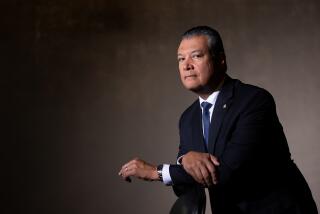Torture makes justice impossible
- Share via
WHEN ATTY. GEN. Alberto Gonzales announced shortly before Thanksgiving that Jose Padilla had been indicted, it came as some surprise that what he was actually charged with had virtually nothing to do with what the United States had been saying about Padilla for the more than three years that he was held in military custody as an “enemy combatant.” In news conferences, Gonzales’ predecessors had described Padilla as public enemy No. 1: an Al Qaeda operative accused of plotting to detonate a “dirty bomb” and to blow up apartment buildings.
But the indictment makes none of those claims. Instead, it charges Padilla only with playing an extremely marginal role helping a group of people who are alleged to have conspired to provide financial support to unspecified terrorists abroad. No one in the indictment is alleged to have engaged in or plotted any violence, and the allegations specific to Padilla do not even claim that he provided financial support to terrorists. Indeed, the government’s case against Padilla is so flimsy that there is a substantial chance that he will be acquitted -- that is, if he can get a fair trial after the public image the Justice Department has painted of him.
The disconnect between the allegations aired in news conferences and the charges lodged in court are disturbing. If Padilla was in fact plotting with Al Qaeda to detonate a dirty bomb, shouldn’t he be tried for that crime, and punished accordingly? Why proceed instead on a paper-thin set of charges that might lead to his acquittal and release?
The answer is, in a word, torture. Administration sources explained to New York Times reporters Douglas Jehl and Eric Lichtblau that the reason they did not charge Padilla with more serious crimes is that the evidence allegedly supporting those charges was extracted from high-level Al Qaeda detainees -- Khalid Sheikh Mohammed and Abu Zubeida -- through questionable means. They are being held in undisclosed locations and reportedly have been interrogated with such tactics as “waterboarding,” in which the suspect is made to think he will drown if he doesn’t talk.
Evidence obtained through waterboarding would never be admissible in a court of law. The Supreme Court has long made clear that evidence obtained through any physical coercion is per se inadmissible. And this is no technicality. Such measures are said to produce inherently unreliable evidence and “shock the conscience.”
The Padilla case illustrates one of the oft-overlooked costs of torture and other means of coercive interrogation -- the very tactics the administration is seeking to preserve in its fight against an amendment offered by Sen. John McCain (R-Ariz.) that would prohibit all such methods. Because evidence obtained through coercion is universally viewed as inadmissible in court, the tactics effectively immunize suspects and those they implicate from prosecution.
This problem not only infects the Padilla case but virtually everyone held at Guantanamo Bay, Cuba, and in secret CIA “black sites.” The U.S. is holding about 500 “enemy combatants” at Guantanamo and reportedly another 30 or more in undisclosed locations. Many of these are alleged to be Al Qaeda fighters, some very high level. Khaled Sheikh Mohammed, for example, is said to be the mastermind of the 9/11 attack.
Anyone who fights for Al Qaeda is guilty of war crimes, as Al Qaeda has no right to engage in war and has adopted a policy and practice of targeting civilians. In theory, we should be able to try them, convict them and imprison them.
But more than four years after President Bush created military tribunals, not a single case has gone to trial. Only a handful of the hundreds of detainees have even been charged. One probable reason for the military’s reluctance is the real risk that any trial will turn into a trial of the United States’ own interrogation practices. Although the military tribunal rules do not exclude the use of testimony extracted by torture, no trial will ever be viewed as legitimate if it allows such testimony, and defense lawyers are certain to make this a central issue in any proceeding.
In short, by electing early on to violate the universal prohibition on torture and cruel, inhumane and degrading treatment, the administration has not only inflicted unconscionable harm on detainees from Abu Ghraib to Guantanamo, and done incalculable damage to the U.S. image abroad, it has painted itself into a corner. It is becoming increasingly unacceptable to hold so-called enemy combatants indefinitely without trial. But we have shielded the vast majority of them from being tried for the wrongs they may well have committed.
President Bush vowed shortly after 9/11 that he would capture the terrorists and bring them to justice. But his own tactics have made that promise impossible to deliver.
More to Read
Get the L.A. Times Politics newsletter
Deeply reported insights into legislation, politics and policy from Sacramento, Washington and beyond. In your inbox twice per week.
You may occasionally receive promotional content from the Los Angeles Times.










